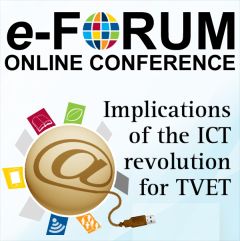
The UNESCO-UNEVOC International Centre: Who We Are | What We Do | Working With Us | Get in Touch
The UNEVOC Network: Learn About the Network | UNEVOC Network Directory
For Members: UNEVOC Centre Dashboard
Thematic Areas: Inclusion and Youth | Digital Transformation | Private Sector Engagement | SDGs and Greening TVET
Our Key Programmes & Projects: BILT: Bridging Innovation and Learning in TVET | Building TVET resilience | TVET Leadership Programme | WYSD: World Youth Skills Day
Past Activities: COVID-19 response | i-hubs project | TVET Global Forums | Virtual Conferences | YEM Knowledge Portal
Our Services & Resources: Publications | TVET Forum | TVET Country Profiles | TVETipedia Glossary | Innovative and Promising Practices | Toolkits for TVET Providers | Entrepreneurial Learning Guide
Events: Major TVET Events | UNEVOC Network News

Introduction | Messages | Participants |1|http://www.unevoc.unesco.org/subscribe.php?id=-1&fita=vcit|Sign up -->| -->Sign up -->
UNEVOC e-Forum, 14 to 28 May 2013
 What are the implications of the ICT revolution for TVET?
What are the implications of the ICT revolution for TVET?
New technologies allow for better and easier access to education, nationally and across borders. The availability of broadband internet is increasing in all parts of the world. While access to learning resources used to be very restricted, more and more high-quality resources become available for free, anytime, almost anywhere. At the learner’s end mobile digital devices become cheaper and more easily available and are being introduced increasingly in educational contexts. Around the world, Information and Communication Technologies (ICT) enable the implementation of education and training, the provision of learning content, and communication between teachers and learners. For that purpose, ICT should be harnessed with the purpose of providing more widespread access to TVET.
In 2008, UNESCO defined its vision for ICT in education: “A world without boundaries where technologies support education to build inclusive knowledge societies”. Information and Communication Technologies (ICT) are fostered by UNESCO-UNEVOC by using its online services as a tool to communicate with the UNEVOC Network and facilitate knowledge exchange in the global TVET community.
To explore the role ICT plays in access to and quality of TVET, UNESCO-UNEVOC is organizing a virtual conference on ICT and TVET from 14 to 28 May 2013 on the UNEVOC e-Forum. The 2-week discussion will aim to explore ICT as a tool for increasing the reach and effectiveness of TVET worldwide, and will look to identify how mobile, online and multimedia learning can best be used to complement or even replace traditional TVET Centre based education. What are the implications of the digital learning revolution for TVET around the world? UNESCO-UNEVOC is calling for e-Forum members and the global TVET community to share their experiences and promising practices in utilizing ICT in TVET.
The input to the discussion will be synthesized and summarized into a report, which will provide directions for future research and programme work in this field. To sign up for the discussion, click here.
 The discussion will be moderated by Nik Kafka, CEO & founder of Teach A Man To Fish, an international NGO supporting schools across the developing world to use enterprise initiatives as means of improving their financial sustainability and broadening access for the poorest children to a quality education. From a career in banking an interest in social change led him to Paraguay where he worked on a pioneering model for self-sufficient vocational schools; laying the basis to create Teach A Man To Fish on his return. He is an active member of several boards as well the World Economic Forum’s Young Global Leader community and has been an active member of the UNEVOC e-Forum since 2006.
The discussion will be moderated by Nik Kafka, CEO & founder of Teach A Man To Fish, an international NGO supporting schools across the developing world to use enterprise initiatives as means of improving their financial sustainability and broadening access for the poorest children to a quality education. From a career in banking an interest in social change led him to Paraguay where he worked on a pioneering model for self-sufficient vocational schools; laying the basis to create Teach A Man To Fish on his return. He is an active member of several boards as well the World Economic Forum’s Young Global Leader community and has been an active member of the UNEVOC e-Forum since 2006.
 Participants are invited to read the background note for the virtual conference:
Participants are invited to read the background note for the virtual conference:
What are the implications of the ICT revolution for TVET? (Nik Kafka, 8 May 2013, pdf, 135 kB)
The discussion is divided into 4 main topic areas:
Once you have signed up and the conference has started, you will receive an opening email by the moderator, Nik Kafka. You can then reply to this message and will receive any contributions made by other conference participants.
Note that all messages will be checked by UNEVOC before dissemination, so there may sometimes be delays, especially outside UNEVOC office hours (9am-5pm CET).
Please use the registration form to sign up for the conference. You will then be added to a conference mailing list and will receive all contributions via email.
Note that if you do not wish to receive email notifications, you can also participate using the online interface by logging on with your UNEVOC account.